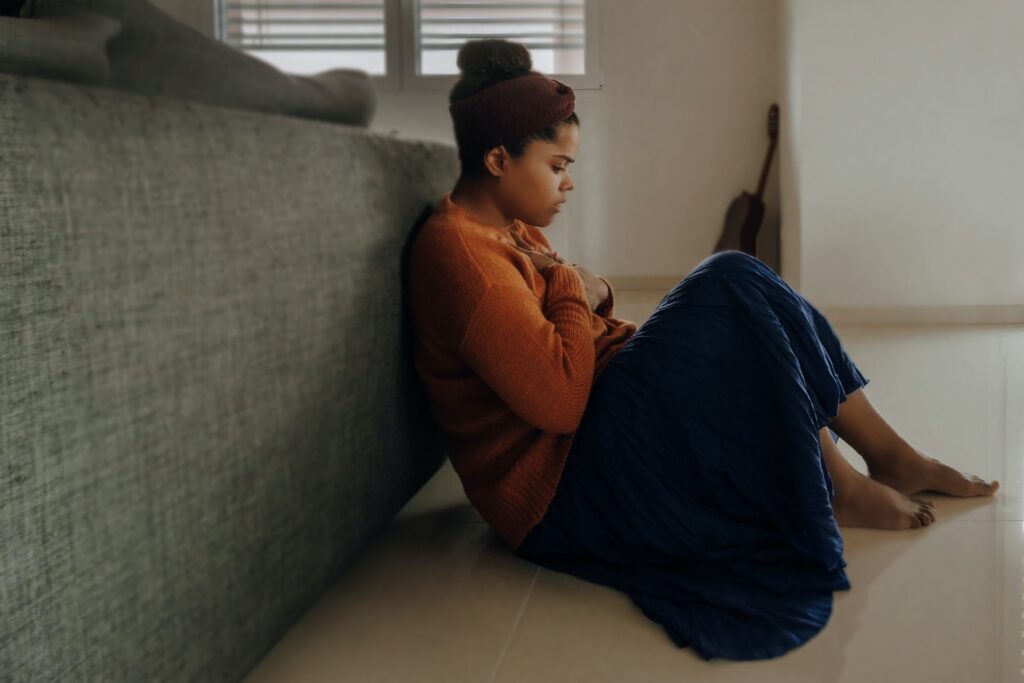
Nighttime Anxiety: Understanding Worsening Symptoms
Nighttime anxiety is a common but frustrating phenomenon that prevents people from relaxing and falling asleep. Physiological and chemical shifts in the brain, among others, may contribute to this paradoxical feeling. This article will delve deeper into why anxiety tends to intensify at night, explore the underlying causes, and provide practical steps to manage evening anxiety for a more restful sleep and improved well-being.
Why Does Anxiety Get Worse at Night?
Most people believe their stress levels are at their lowest right before bed, making it the perfect time to unwind and recharge. However, many people experience their worst panic attacks at night. Several things, such as the cumulative effects of stress throughout the day and alterations in hormone and chemical levels, contribute to this apparent contradiction.
Looking for CBD products to help with anxiety? Check out our selection today.
An Anxious Day Creates an Anxious Night
How one deals with stress and anxiety during the day can directly impact how one sleeps at night. In a culture that prizes efficiency and constant contact, taking time to unwind and focus on the present is more important than ever. Reducing the likelihood that nighttime anxiety will prevent sleep by effectively managing stress during the day.
Sleeplessness and Hormonal Disruption
Anxiety is a common symptom of hormonal imbalance, which plays a pivotal role in women’s health. Polycystic ovary syndrome (PCOS) is a hormonal disorder that prevents ovulation and has been linked to increased anxiety in the premenstrual period. An overactive fight-or-flight response in the body can lead to heightened anxiety, especially at night when relaxation should prevail, but nutrient deficiencies, high-stress occupations, a lack of support for busy mothers, inadequate nutrition, and excessive exercise can all contribute to this.
Having Trouble Digesting and Feeling Uneasy
The gut-brain axis, which describes the connection between the digestive system and the brain, highlights the importance of gut health to psychological well-being. Anxiety symptoms can be made worse by inflammation brought on by allergens like gluten and dairy, as well as by imbalances like Candida overgrowth and leaky gut syndrome. If you want to feel less anxious and sleep better, your gut health needs to be prioritized.
Related Link: CBD for Sleep Versus Other Sleep Aids
How to Fall Asleep Easier
Engage In The Present Moment
People with anxiety disorders often spend a great deal of time fretting about the future or reliving the past. This is a common trait that can make everyday stresses worse. Mindfulness can help people overcome their tendency to dwell on negative thoughts by retraining their brains to look for the good in the present. The ability to practice mindfulness and hone it over time can help one feel more at peace and less anxious.
Allow Yourself Downtime Before Bed
It’s easy to let our hectic, demanding lives keep us preoccupied right up until we finally get into bed. However, a hectic routine right before bedtime interrupts the body’s internal clock and makes it harder to fall asleep. Time must be set aside specifically for winding down in order to make the shift from wakefulness to sleep as smooth as possible. This time permits the mind and body to unwind and promotes the release of melatonin, a sleep-inducing hormone. Engaging in activities that help you unwind can be helpful, such as taking a warm bath, writing in a journal, or reading. Additionally, preparing the mind for restful sleep includes minimizing exposure to blue light emitted by electronic devices.
Maintain a Regular Bedtime Ritual
The best way to deal with nighttime anxiety is to create a regular bedtime routine that focuses on relaxing activities. Diffusing calming essential oils like lavender, listening to soft music, or engaging in light stretching and deep breathing before bed can all help send the body and mind a message that it’s time to wind down and get some shut-eye. Maintaining a regular bedtime ritual prepares the mind and body for a restful night’s sleep.
Get some fresh air and sunshine first thing or after work
The circadian rhythm, which controls sleep and wake times, is influenced by exposure to natural light, especially in the morning and evening. Being exposed to natural light during these times produces melatonin, leading to improved sleep and less cortisol, a hormone that can amplify anxiety, being released. Morning walks and evening yoga sessions in the great outdoors can help you get a better night’s sleep and feel less anxious when you go to bed.
Never use social media before bed
Staying up late perusing social media or doing other online activities is tempting. However, these pursuits stimulate the brain, making it harder to fall asleep. Avoiding the use of electronic devices and social media in the bedroom can help create an atmosphere that is peaceful and free of distractions, ideal for getting a good night’s sleep.
Take Supplements Before Bed to Ease Anxiety
Anxiety can be managed more effectively at night with the help of certain supplements that have been shown to have a calming effect. Magnesium, a mineral with calming effects, can help calm an anxious or overactive mind at bedtime. The calming effects of chamomile tea make it a great addition to a pre-bedtime ritual. In addition, magnolia bark, a common component in Eastern medicine, has been shown to shorten the time it takes to fall asleep and lengthen the amount of time spent asleep.
Searching for CBD products to help with anxiety? Check out our CBD selection today.
Understanding Nighttime Anxiety
Nighttime anxiety affects a substantial number of individuals, regardless of whether they have been diagnosed with anxiety disorders. When dealing with anxiety, it’s helpful to take a more holistic approach that takes into account the myriad of factors that can affect one’s state of mind at any given time. Minimizing nighttime anxiety and fostering a more restful sleep can be accomplished by attending to stress and anxiety during the day, addressing hormonal imbalances, and improving digestive health. Nighttime anxiety can be alleviated by incorporating mindfulness practices, establishing regular bedtime routines, spending time outdoors, and limiting screen time in the hours leading up to bedtime. Overcoming nighttime anxiety, improving sleep, and boosting mental and emotional health all require a holistic approach.
Related Link: Still Awake? Five Examples of CBD Helping People Sleep

